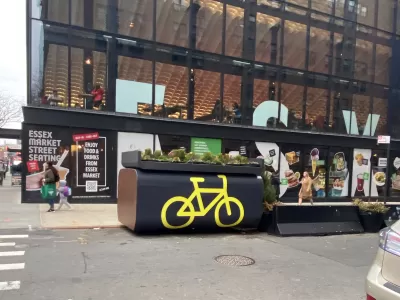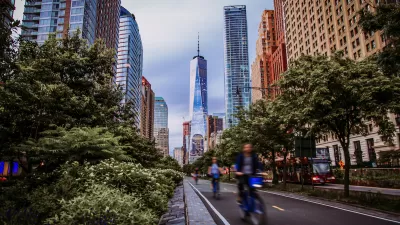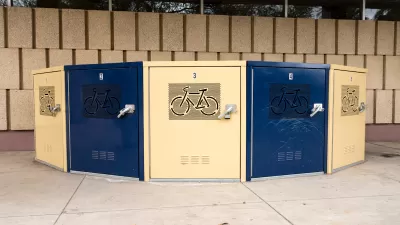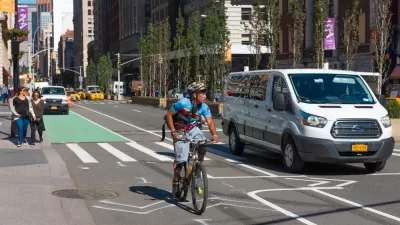While the city waits to evaluate data, advocates argue that recent demonstration projects have already proven the popularity of secure bike parking.

After six months of a successful secure bike parking program in a partnership with Oonee at locations around New York City, bike advocates are wondering what the holdup is.
According to a statement from the city’s Department of Transportation, “DOT stands by its commitment in the Streets Plan to continue exploring secure bike parking, and looks forward to reviewing the data from the Oonee demonstration.” Yet, according to an article by Gersh Kuntzman for Streetsblog NYC, “There’s already ample data on Oonee’s efficacy” in previous pilot programs.
The recent program, Kuntzman argues, will likely not show similarly robust results simply because “By the time locals figured out what the device was and how to use it, it was gone.” Anecdotally, people who used the secure parking expressed enthusiastic support for the service. “The need, and the public demand, for secure bike parking has long been documented, most recently in a Transportation Alternatives report that documented that a lack of safe places for bike parking not only reduces cycling, but reduces safety, increases theft (particularly to working cyclists) and hurts local businesses.”
A network of secure bike parking could also encourage more people to replace car trips with bike trips and lower their carbon footprint. “Earlier this year, a study on climate change mitigation by Cornell University’s School of Industrial and Labor Relations recommended the conversion of 5 percent of street parking spaces into 150,000 sheltered bike parking spaces by 2025.”
FULL STORY: After Successful Bike Parking Demo, DOT is Rightfully Being Asked, ‘What Now?’

Planetizen Federal Action Tracker
A weekly monitor of how Trump’s orders and actions are impacting planners and planning in America.

Map: Where Senate Republicans Want to Sell Your Public Lands
For public land advocates, the Senate Republicans’ proposal to sell millions of acres of public land in the West is “the biggest fight of their careers.”

Restaurant Patios Were a Pandemic Win — Why Were They so Hard to Keep?
Social distancing requirements and changes in travel patterns prompted cities to pilot new uses for street and sidewalk space. Then it got complicated.

Platform Pilsner: Vancouver Transit Agency Releases... a Beer?
TransLink will receive a portion of every sale of the four-pack.

Toronto Weighs Cheaper Transit, Parking Hikes for Major Events
Special event rates would take effect during large festivals, sports games and concerts to ‘discourage driving, manage congestion and free up space for transit.”

Berlin to Consider Car-Free Zone Larger Than Manhattan
The area bound by the 22-mile Ringbahn would still allow 12 uses of a private automobile per year per person, and several other exemptions.
Urban Design for Planners 1: Software Tools
This six-course series explores essential urban design concepts using open source software and equips planners with the tools they need to participate fully in the urban design process.
Planning for Universal Design
Learn the tools for implementing Universal Design in planning regulations.
Heyer Gruel & Associates PA
JM Goldson LLC
Custer County Colorado
City of Camden Redevelopment Agency
City of Astoria
Transportation Research & Education Center (TREC) at Portland State University
Camden Redevelopment Agency
City of Claremont
Municipality of Princeton (NJ)





























